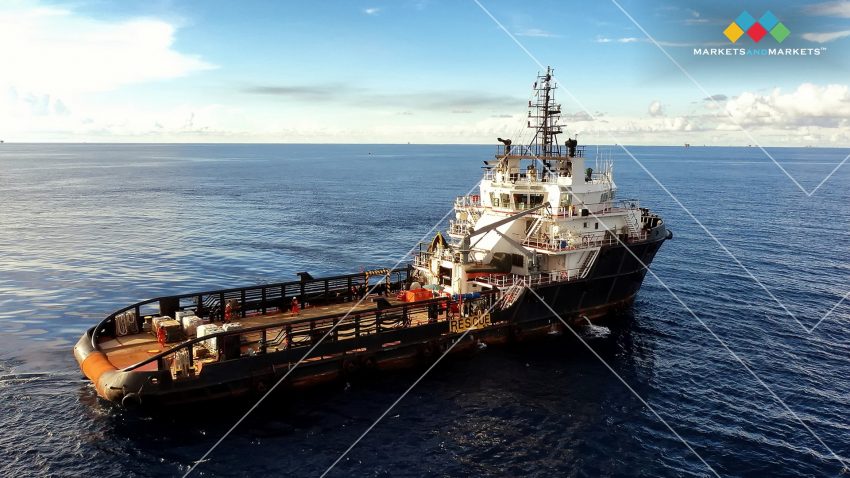The global Offshore Support Vessel Market size is expected to grow from USD 25.6 billion in 2024 to USD 36.3 billion by 2029, at a CAGR of 7.2% during the 2024-2029. An offshore support vessel (OSV) is specially designed to support offshore exploration, drilling, production, and construction activities in the oil & gas industry. These vessels provide a range of services, such as transportation of personnel, equipment and supplies, maintenance and repair, and oil spill response. OSVs are also used for specialized tasks such as platform installation, decommissioning, seismic surveying, providing firefighting, towing, and positioning of drilling rigs and other offshore structures, and subsea construction. These vessels are equipped with dynamic positioning systems to maintain their position in rough seas and are built to withstand harsh offshore conditions. Different types of offshore support vessels are used in offshore oil & gas and offshore wind applications. OSVs play a crucial role in offshore oil & gas and offshore wind farms by enabling safe and efficient operations.
The global offshore support vessel market is anticipated to grow at a higher level. There are various drivers responsible for the growth of the market such as government policies and incentives and technological advancements among others. The rising global demand for energy, particularly from developing countries, pushes the need for increased offshore exploration and production, subsequently driving the OSV market.
Download PDF Brochure: https://www.marketsandmarkets.com/pdfdownloadNew.asp?id=1212
The expansion of exploration and production activities in emerging offshore markets, particularly in deepwater reserves and Arctic regions, is creating significant new opportunities for offshore support vessel operators and manufacturers. These frontier areas are attracting substantial investments from oil and gas companies seeking to tap into previously unexplored or underexplored hydrocarbon reserves.
Deepwater reserves often found off the coasts of countries like Brazil, Guyana, and West Africa, present unique challenges and opportunities. The complex and demanding nature of deepwater drilling operations necessitates specialized support vessels equipped with advanced technology and capabilities. These vessels must be able to operate in harsh conditions, provide reliable support for drilling rigs, transport personnel and supplies, and ensure safety and efficiency in deepwater environments.
Regional Analysis
The relentless global demand for energy continues to drive significant growth in offshore exploration and production activities, especially in resource-rich regions like the Gulf of Mexico. This area’s abundant oil and gas reserves attract major energy companies and independent operators, making it a prime target for exploration and production initiatives. Offshore support vessels (OSVs) play a crucial role in these ventures, providing essential services such as transporting supplies, equipment, and personnel, as well as performing specialized functions like anchor handling and subsea construction support. Technological advancements in OSV design, including dynamic positioning systems and automated tools, have enhanced operational efficiency and safety, further boosting their importance in offshore operations.
Request Sample Pages: https://www.marketsandmarkets.com/requestsampleNew.asp?id=1212
Key Market Players:
Some of the major players in the Offshore Support Vessel Companies are A.P. Moller-Maersk (Denmark), Tidewater Inc. (US), BOURBON (France), Edison Chouset Offshore (US), and Deltamarin Ltd (Europe).
A.P. Moller-Maersk
A.P. Moller-Maersk, commonly known as Maersk, is a global leader in container shipping, logistics, and energy sectors. While historically renowned for its container shipping operations, Maersk has also ventured into the offshore support vessel market. The company’s presence in the OSV market is backed by its extensive fleet, modern technology, and global reach. Maersk Supply Service focuses on delivering efficient and reliable solutions to its customers, leveraging its expertise in maritime operations and commitment to safety and sustainability. The company offers offshore support services through its Towage & Marine Services business segment. Maersk Group offers marine services and integrated energy industry solutions with its anchor-handling tug supply (AHTS) fleet and subsea support vessels. A.P. Moller – Maersk has offices in Angola, Australia, Brazil, Canada, Equatorial Guinea, Ghana, Mexico, the Philippines, Singapore, and the UK.
Tidewater
Tidewater Inc., established in 1956 and headquartered in Houston, Texas, is a prominent provider in the offshore support vessel (OSV) market. The company operates a diverse fleet of vessels, including platform supply vessels (PSVs), anchor handling tug supply vessels (AHTSVs), fast crew supply vessels (FCSVs), and specialty vessels. These vessels support offshore exploration, production, and transportation activities globally, with a significant presence in key regions such as the Gulf of Mexico, North Sea, Southeast Asia, West Africa, and the Middle East. Tidewater focuses on maintaining a modern fleet, pursuing strategic acquisitions like GulfMark Offshore, and emphasizing sustainability through energy-efficient operations.

